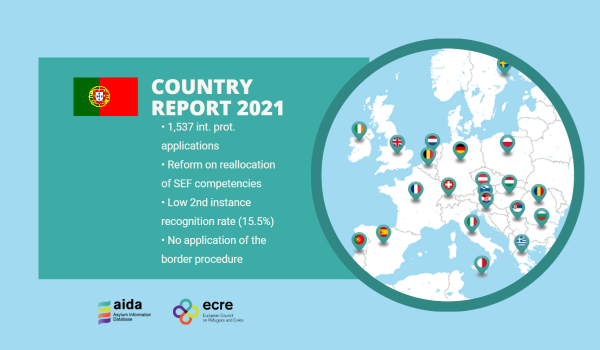The updated AIDA Country Report on Portugal provides a detailed overview on legislative and practice-related developments in asylum procedures, reception conditions, detention of asylum seekers and content of international protection in 2021.
A total of 1,537 applications for international protection were registered in Portugal in 2021. While this reflected a return to pre-pandemic figures (in 2019, 1,849 applications were registered), a significant part of the total refers to persons evacuated from Afghanistan and admitted to Portugal (768) and persons relocated to the country (279). As such, the number of spontaneous applications remained comparatively low, which is likely still connected to the restrictions upon international travel linked to the coronavirus pandemic. The overall protection rate was of 42%, and the main countries of origin of applicants in 2021 were Afghanistan, Morocco and India. While all Afghan applicants were recognised refugee status, for the applicants of the other two most represented nationalities only rejection decisions were issued. The overall success rate of appeals at national level remained quite low, standing at 15.5% in 2021.
According to the information provided by UNHCR, 299 refugees were resettled to Portugal in the course of 2021. Out of these, 116 were resettled from Egypt, and 183 from Turkey. The majority of those resettled were Syrians, but nationals from Sudan, Somalia, Ethiopia and Iraq were also resettled to Portugal.
International protection applicants that presented their application at the border were in general granted access to the national territory, referred to the provision of reception conditions if needed, and their cases were not subject to the rules applicable to the border procedure, that was not applied throughout the year.
In terms of measures dedicated to vulnerable applicants, in addition to the existing general national referral mechanism for victims of trafficking in human beings, the national “Protocol for the definition of procedures aimed at the Prevention, Detection and Protection of (presumed) children victims of Trafficking in Human Beings – National Referral Mechanism” was launched in 2021. The new referral mechanism aims to establish specific procedures, to reinforce cooperation and communication among professionals and to ensure respect for the best interests of the child. One of the practical tools focus on identification at the border, explaining the referral and identification procedures together with relevant indicators. On the other hand, the lack of a national strategy dedicated to addressing the needs of asylum-seeking unaccompanied children and children reaching the majority of age while in the asylum procedure was a cause of concern.
Regarding legislative changes, the main piece of legislation of the structural reform of the Immigration and Borders Service (SEF) that provides for the reallocation of SEF’s competencies to existing or new entities, announced by the Government in 2020, was approved in November 2021.
In July 2021, the Portuguese Government adopted the National Plan to Combat Racism and Discrimination 2021-2025. The UN Working Group of Experts on People of African Descent held a press conference following its visit to Portugal in December 2021, where it showed concern with racial discrimination and with the respect for the human rights of people of African descent in the country.
For what concerned integration measures, it was noted that Portugal has not developed a structured plan for reception and integration of refugees, identified a number of coordination issues, and challenges faced by frontline service providers.
For further information:
- AIDA 2021 Update: Portugal, Summary in Portuguese, May 2022
This article appeared in the ECRE Weekly Bulletin. You can subscribe to the Weekly Bulletin here.

